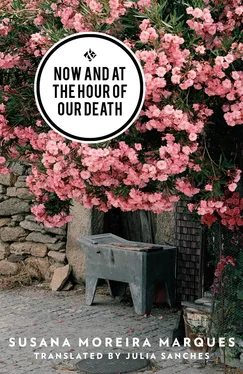If you don’t want to know the answer, don’t ask the question.
*
The road, the road, the road, the road, the road, the road, the road, the road, the road, the road, the road, the road, the road… A bird of prey snatches her kill off the tarmac then flies away… The road, the road, the road, the road, the road, the road, the road, the road, the road, the road, the road, the road, the road, the roa
*
The hunter who liked flowers also liked collecting animals and displaying them above the living-room cabinet. The hunter who liked flowers also liked his wife to feel like his prey: frightened and cornered. He had been unhappy for most of his life in a city in another country; he had suffered humiliations, but he also liked to humiliate others. The last time, using only his eyes, he had made his wife feel as if she should be the one to die first. When he knew he would not survive his illness and that he would no longer be able to walk through the vast field in front of his house, the hunter who liked flowers begged for mercy, begged them to kill him quickly, please. He died in bed having said no meaningful last words and, that day, in the yard, a pup that would never grow up to be a hunting dog was born. The hunter was carried to a coffin and his wake was held in his living room — the stuffed birds with their fanned-out wings watching from their perch above the cabinet. The porch overlooks a view of the land that had been his greatest pride and that he had hoped to enjoy in his old age. On it stood his favorite flowerpot, in which flowers bloomed even in the spring after his death.
Whenever the wife of the hunter who liked flowers glances through the bedroom door, she sees her husband climb into bed, lie down, die. She sees him dying over and over and not once does he ask for her forgiveness. She still sleeps beneath his accusing eyes, and asks herself why, if it had indeed been her duty, she had not gone first. She lives alone now and the flowers he left behind are of little comfort to her.
*
An island, but instead of sea, land.
*
The swimming pool is empty. This somehow makes it seem bigger. The woman looks out at the pool from her window and thinks of the years that have passed since it was last filled with water and people — so many people, from so many villages (where have they all gone?) — and of how she would keep the bar open into the night, as long as there were customers to serve. From her window she sees the loneliness of the land. When she speaks to her neighbors, she yells to make sure she is heard. Her husband died deceived, blessedly deceived: he never knew what he suffered from, never knew he was condemned. She lied to him every day with conviction: it was the best way she knew of protecting him and she does not regret it. But she suspects that death begins long before we fall ill, with neither suffering, nor drama, nor a single memorable occurrence.
*
CONSPIRACY OF SILENCE: 1. Technical term used to describe a situation in which family members will conceal the patient’s illness from the patient. The doctor is either persuaded to do so as well or will suggest maintaining the illusion. 2. Term also used in situations where the patient will pretend not to know what he or she knows about his or her illness and, thinking that their family members know nothing, will ask the doctor to conceal this information from the rest of the family. 3. In which the patient pretends not to know the gravity of the situation and pretends he or she doesn’t know that the family knows.
*
As the sun sets over the plateau, white houses gleam momentarily then settle into darkness. Later, there will be those who sleep while others do not. It is always worse at night, when the sick become agitated and their families wake up and spend the night fearing it might be the last. And if it isn’t, in the morning they realize they do not feel relieved.
*
At the end of the road is a village from which the children have disappeared. And at the end of another road, another village from which the children have disappeared.
*
In the village there is a chapel, a communal oven, eight lived-in houses. There is no café, grocery, post office, town hall, or bus stop. On one side of the village, there is a hill that caught fire last summer, an event remembered not only for the alarm it caused, but also for its beauty. On the other side snakes a steep road that freezes in the winter and is often impassable. People here live their lives between their homes and their gardens, inhabitants of a Pompeii that has suffered no such natural disaster.
*
There are metaphors along the road: ripe fruit falling from trees; paths cut off abruptly; and the journey itself, an age-old metaphor for life and for the end of life. And yet, the surest metaphor for death is war: a person struggling in bed for years and years until their breathing is finally mistaken for moaning.
*
We obsess over lasts as we do over firsts. Last days, last images, last words. We want signs.
*
I knock on the door of a man who knows he will die, hoping he’ll tell me how it feels to be a man who knows he will die. He has prepared his family for their mourning so that it is easier on them; he has said goodbye to those he wanted to say goodbye to.
The nurse shaves his beard so that he may appear dignified despite the pajamas, the diapers, the drool. For a few seconds, the man, his eyes bulging, looks at me, a stranger. His eyes roll back into his head. I haven’t made it in time. The man can no longer speak. He is focused solely on dying, a task that seems to require a tremendous effort.
*
Survival Guide:
2. Think of death in detail. Don’t think of the whole.
*
There are crosses on the way, marking car crashes. There are crosses on the way, marking people who fell off horses. There are crosses on the way, marking people who died while walking along its edge. The crosses are made of stone, some are very old and others ghostly new.
*
All that survived in the fire that began with an electric blanket and ended with a wrecked room was a Bible. This was considered a miracle, a sign that God is vigilant and watches over us despite all proof to the contrary. The woman who kept the Bible that survived the fire as a talisman lives with her widowed sister and with a niece who neither talks nor walks; who spends days on end in a windowless room; who, at fifty-seven, still cries and is easily startled; who is scared of strangers and for whom the world — she was very young when she once went to see a doctor in a neighboring country — is no more than those two or three streets.
God visits in the spring, and in the winter, perhaps having forgotten, He does not watch over her to see if she rolls her wheelchair into the light.
*
The same road does not seem the same, and yet every road seems the same. We move in circles, like eagles.
*
Up until just two months ago the shepherd, accompanied by his mad and lovesick wife, would walk every day to the São João fountain to drink water, striving for his miracle. Now he no longer leaves the back room of the retirement home; the room’s windows look out onto the yard and have been blacked out with plastic. He lies shrunken in bed, with an oxygen tank by his side, in a blue robe the color of his eyes. That is where they hid him from his wife who, at the age of eighty, still insisted on trying to sleep with him, which is how he fell out of bed and ended up in the hospital. But his wife, who now sits in the waiting room, sometimes more and sometimes less absent than the rest of the home’s elderly, has already forgotten him. She has forgotten she had a husband who she’d been madly in love with from the age of eighteen, and who made her violently jealous. She no longer asks about him and, when asked herself, answers she was never married. When he dies, she might not even realize and might not even cry.
Читать дальше












